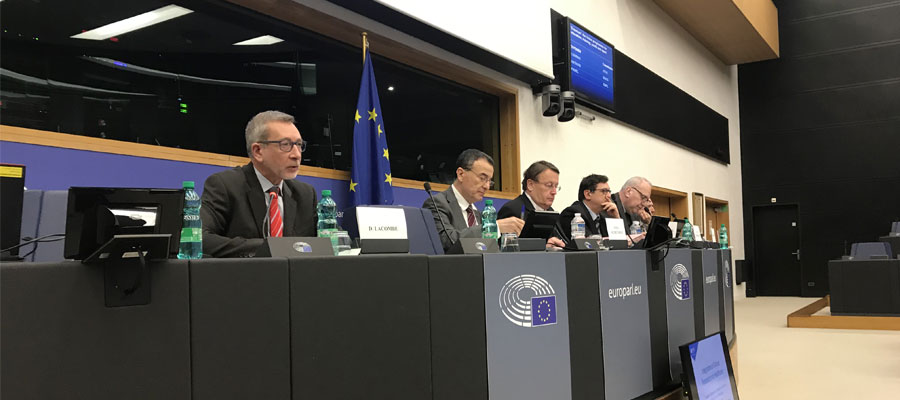Affordable health care leaving no one behind: raising awareness and developing actionable policy options
25 Apr 2019
On 28 March 2019, in Strasbourg, France, EORTC Director General, Dr Denis Lacombe, made a strong plea in front of the members of the Science and Technology Options Assessment (STOA) panel of the European Parliament. Denis Lacombe was invited by STOA to present the preliminary results of a study entitled “Innovative solutions from research into healthcare’ funded by STOA. In this study, EORTC is gathering opinions from stakeholders including patients, clinicians, HTA, pharma, regulators and payers regarding the current way drugs are developed, access to the market and what could be the solutions including treatment optimisation. The video of the session is available here.
Studies in treatment optimisation investigate the use of a drug in real-life. These studies are pragmatic prospective clinical trials randomized as much as possible in unselected patient population. Such trials would generate the evidence on the optimal way to use the drug i.e. treatment duration, dosage and combination with other treatment modalities. Optimisation studies will not replace, but complement regulatory clinical trials in drug development. Treatment optimisation is a way to bridge the so-called efficacy- effectiveness gap, attempting as much as possible to generate level I evidence data that will help clinicians to update treatment guidelines, HTA to assess the value of the drug and payers to decide the reimbursement.
EORTC preliminary results were received well by STOA representatives. In short, interviewees agreed that today, drug development is not sufficiently patient-centred. They confirm the lack of real-world evidence supporting the use of many drugs on the market today, creating too much uncertainty when using new drugs. There was broad support for multi stakeholder collaboration around well-performed treatment optimisation studies.
Treatment optimisation is definitively not a new concept, many examples exist such as the following EORTC studies comparing standards of care: EORTC 1206:“A randomised study to evaluate the efficacy and safety of chemotherapy vs androgen deprivation therapy in patients with salivary gland cancer” or the EORTC study 55994 “randomized study of neoadjuvant chemotherapy followed by surgery vs. concomitant radiotherapy and chemotherapy in cervical cancer”. However, treatment optimisation is still not systematically implemented in drug development, leaving uncertainty how to use optimally treatments. In fact, pharma may be de-incentivized to further understanding the role of treatments after their drugs are authorised on the market.
The preliminary results of this research are in line with EORTC initiative around the manifesto for “a new approach for better medicine in Europe – Establishing treatment optimization as part of personalized medicine development” launched during an event in the European Parliament in Brussels in January 2019. The current version of the manifesto is accessible here. Many stakeholders have joined in supporting the manifesto, such as Members of the European Parliament, patient organisations, scientific societies, biotechnology and pharmaceutical industry representatives. The Manifesto emphasizes:
- Treatment optimisation should be a mandatory step in the treatment’s path to market access;
- Treatment optimisation studies should not delay patient access to innovative therapies;
- Treatment optimisation studies should be based on partnership between pharma, academics, patients and funded by public and private sources.
What are the next steps? EORTC; in collaboration with experts from the Katholieke Universiteit Leuven (KUL), have identified actionable policy options. We believe the currently underused Managed Entry Agreements could be revised to include mandatory research on treatment optimisation. The revision of the EU 507/2006 regulation on the conditional marketing authorisation is warranted. Clearly, it will need to be coordinated at national and European levels. EORTC and the KUL are currently investigating with experts and decision-makers on how to make it happen technically as well as politically.
Moving this initiative forward through the European trilogue will require more efforts in raising stakeholder’s awareness and also engaging with decision-makers after the upcoming national and European elections in May.
Letter to the EJC editor on Establishing Treatment Optimization as part of personalized medicine development can be seen here.
Related News
EORTC: Advancing research and treatment for rare cancers
29 Feb 2024
EORTC Fellowship Programme: celebrating more than 20 years of impactful collaboration
22 Feb 2024
Appointment of Malte Peters as EORTC Strategic Alliance Officer
9 Feb 2024
Unique series of workshops in partnership with the European Medicines Agency (EMA)
7 Feb 2024
EORTC launches a prominent clinical trial in older patients with locally advanced (LA) HNSCC (Head and Neck Squamous Cell Carcinoma)
14 Dec 2023
Seven IMMUcan abstracts selected for ESMO Immuno-Oncology Congress 2023
6 Dec 2023
EORTC Quality of Life measures integrated in CDISC
20 Nov 2023
EORTC and Immunocore are collaborating to launch the ATOM clinical trial of tebentafusp in Adjuvant Uveal Melanoma
7 Nov 2023
Treatment with decitabine resulted in a similar survival and fewer adverse events compared with conventional chemotherapy in older fit patients with acute myeloid leukaemia
31 Oct 2023
New results and forthcoming EORTC trials in rare cancers, lung, head and neck, and breast carcinomas presented at ESMO 2023
20 Oct 2023


